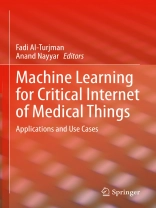This book discusses the applications, challenges, and future trends of machine learning in medical domain, including both basic and advanced topics. The book presents how machine learning is helpful in smooth conduction of administrative processes in hospitals, in treating infectious diseases, and in personalized medical treatments. The authors show how machine learning can also help make fast and more accurate disease diagnoses, easily identify patients, help in new types of therapies or treatments, model small-molecule drugs in pharmaceutical sector, and help with innovations via integrated technologies such as artificial intelligence as well as deep learning. The authors show how machine learning also improves the physician’s and doctor’s medical capabilities to better diagnosis their patients. This book illustrates advanced, innovative techniques, frameworks, concepts, and methodologies of machine learning that will enhance the efficiency and effectiveness of the healthcare system.
- Provides researchers in machine and deep learning with a conceptual understanding of various methodologies of implementing the technologies in medical areas;
- Discusses the role machine learning and Io T play into locating different virus and diseases across the globe, such as COVID-19, Ebola, and cervical cancer;
- Includes fundamentals and advances in machine learning in the medical field, supported by significant case studies and practical applications.
Tabella dei contenuti
Introduction.- An Introduction to Basic Concepts on Machine Learning, its architecture and framework.- Machine Learning Models and techniques.- Diseases diagnosis and prediction using Machine Learning.- Machine learning for Mobile/e-health, Tele-medical and Remote healthcare networks.- Machine learning in biomedical, Neuro-critical and medical image processing field.- AI, Deep learning and machine learning enabled connected health informatics.- Machine learning enabled smart healthcare system.- Machine learning based efficient health monitoring systems.- Machine learning case study for virus disease Ebola, COVID-19 consequences.- CASE Study: Machine Learning in Medical domain for Cervical Cancer.- Use cases and applications of machine learning in medical domain.- Conclusion.
Circa l’autore
Prof. Dr. Fadi Al-Turjman received his Ph.D. in computer science from Queen’s University, Kingston, Ontario, Canada, in 2011. He is a full professor and a research center director at Near East University, Nicosia, Cyprus. Prof. Al-Turjman is a leading authority in the areas of smart/intelligent, wireless, and mobile networks’ architectures, protocols, deployments, Multimedia analysis and performance evaluation. His publication history spans over 250 publications in journals, conferences, patents, books, and book chapters, in addition to numerous keynotes and plenary talks at flagship venues. He has authored and edited more than 25 books about cognition, security, and wireless sensor networks’ deployments in smart environments, published by Taylor and Francis, Elsevier, and Springer. He has received several recognitions and best papers’ awards at top international conferences. He also received the prestigious Best Research Paper Award from Elsevier Computer Communications Journal for the period 2015-2018, in addition to the Top Researcher Award for 2018 at Antalya Bilim University, Turkey. Prof. Al-Turjman has led a number of international symposia and workshops in flagship communication society conferences. Currently, he serves as an associate editor and the lead guest/associate editorfor several well reputed journals, including the IEEE Communications Surveys and Tutorials(IF 22.9)and the Elsevier Sustainable Cities and Society(IF 4.7).
Anand Nayyar (Senior Member, IEEE) received the Ph.D. degree in computer science from Desh Bhagat University, in 2017, in the area of wireless sensor networks. He is currently working with the Graduate School, Duy Tan University, Da Nang, Vietnam. He is also a Certified Professional with more than 75 professional certificates from CISCO, Microsoft, Oracle, Google, Beingcert, EXIN, GAQM, Cyberoam, and many more. He has published more than 300 research articles in various National and International Conferences, and International Journals (Scopus/SCI/SCIE/SSCI Indexed). He is also a member of more than 50 Associations as a Senior Member and a Life Member and also acting as an ACM Distinguished Speaker. He has authored/coauthored cum Edited 25 Books of computer science. He has associated with more than 400 International Conferences as programme committee/advisory board/review board member. He has two patents to his name in the area of Internet of Things and speech processing. He is currently working in the area of wireless sensor networks, MANETS, swarm intelligence, cloud computing, Internet of Things, Blockchain, machine learning, deep learning, cyber security, network simulation, and wireless communications. He has awarded more than 20 Awards for Teaching and Research—Young Scientist, the Best Scientist, the Young Researcher Award, the Outstanding Researcher Award, the Indo-International Emerging Star Award (to name a few). He is acting as the Editor in Chief of IGI-Global, USA journal titled International Journal of Smart Vehicles and Smart Transportation (IJSVST).












